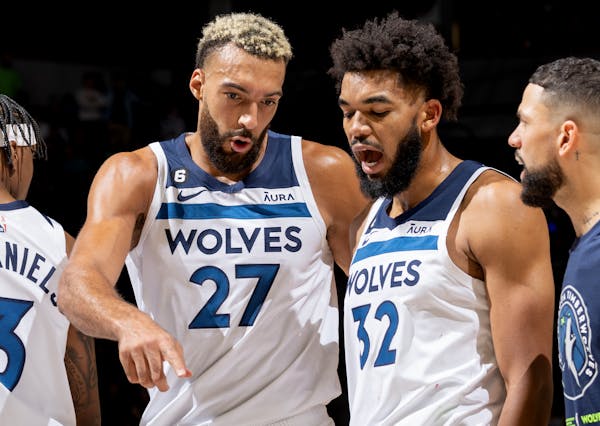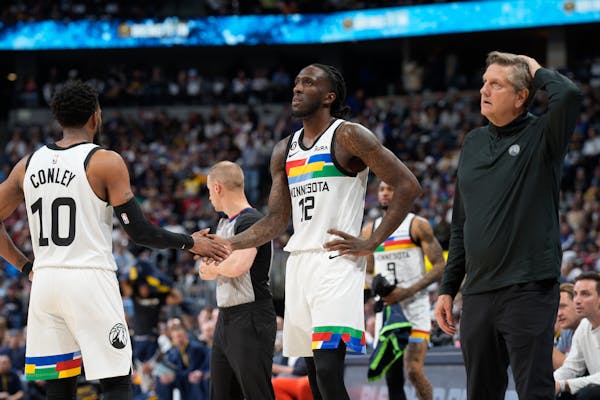Anthony Edwards' shot bounced off the rim, the young All-Star ran directly to the locker room and thus concluded the least enjoyable Timberwolves season since Jimmy Butler went scorched earth on the organization.
The offseason begins at a crossroads for basketball boss Tim Connelly, who staked his reputation and the team's future on a gamble that fell flat in Year 1, at least if based on Karl-Anthony Towns' own "championship or bust" declaration last summer at the dawn of the BIG experiment.
Every option should be in play for Connelly right now. Major changes. Minor tweaks. Something in the middle.
The lone motivation with every decision should be Edwards and how to surround the dynamic guard with the best roster possible. Nothing or no one supersedes that mission.
The temptation will be to blame this turbulent season on injuries, and those disruptions certainly were a factor. But the injury excuse also conveniently ignores an underlying issue that cuts to the heart of their maddening ways.
The Wolves are just an immature bunch.
Coach Chris Finch raised that point once again Tuesday night after the Game 5 elimination loss. Finch applauded his team's competitive fight when backed into a tough spot throughout the season, but then he also noted, "that's not how you want to live."
"A more mature team doesn't find themselves in those situations as much," he said.
This was an NBA coach citing a lack of maturity after Game 89, which is staggering because the Wolves were not a young, inexperienced team still trying to figure out how the NBA works. Edwards is only 21 years old, but the roster includes seven players who are 27 or older.
The cause-effect nature of their immaturity was evident in different ways that had as much to do with their predicament as injuries.
Inconsistency is a sign of immaturity, and the Wolves were nothing if not feast-or-famine. How else to explain the fact that the Wolves posted a winning record against winning teams (25-22) and a losing record against losing teams (17-18).
Among Western Conference teams, they owned the second-best record vs. teams above .500. Of the 20 NBA teams that advanced to the postseason, the Wolves were the only team with a losing record against sub-.500 teams — and no one else was close.
That's inexcusable, even with Towns sidelined for 52 games.
The Wolves had far too many nights when they didn't treat their opponent or their job with a requisite amount of seriousness and professional pride.
Every team tosses out an occasional clunker in an 82-game season. The Wolves produced so many duds that they had to fight down the stretch just to make the play-in tournament. They had enough talent even without Towns to secure a better seed and avoid having to meet top-seeded Denver in the first round.
Both Finch and veteran center Rudy Gobert mentioned "habits" as a root cause for their inconsistency. A team on the verge of something significant is not bemoaning bad habits this late in the process.
The Wolves need to grow up quickly. Any hope of postseason success went out the window in the regular-season finale when Gobert punched teammate Kyle Anderson and Jaden McDaniels suffered a broken hand punching a wall.
And the incessant whining at officials … please tone it down. Every NBA player complains about calls. Somebody gripes on every possession. The Wolves are hardly alone in this area. But their conspiracy theories and belief that officials treat them unfairly have become a self-fulfilling prophecy.
This applies to the whole group, not just Towns.
The Wolves were exhausting to watch this season. And now Connelly faces another defining offseason in which he must decide whether to stay the course or explore trading Towns.
Whatever happens, the lessons learned this season require deep self-reflection. Injuries hurt their cohesion, but the Wolves were too immature to realize their potential.

Wild return to the friendly road, roll past the Blues

Minnesota high school sports scores and results for Tuesday

Gophers men's basketball team slips away from Cleveland State
An emotional Rafael Nadal retires at the Davis Cup after he loses and Spain is eliminated


